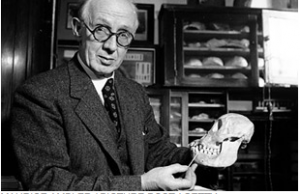 This post is by Prof. Sergio Pagano, a member of the Intelligent Management team and an educator. He teaches physics at the University of Salerno, Italy, and has spent twenty years doing scientific research on superconductive electronics, macroscopic quantum coherence and nonlinear physics, so he is also concerned with innovation in science.
This post is by Prof. Sergio Pagano, a member of the Intelligent Management team and an educator. He teaches physics at the University of Salerno, Italy, and has spent twenty years doing scientific research on superconductive electronics, macroscopic quantum coherence and nonlinear physics, so he is also concerned with innovation in science.
Current Conflict in Education
At Intelligent Management, we are accustomed to framing problems in the form of a conflict, as in keeping with the Theory of Constraints. There is a fundamental conflict in education today, and we may verbalize it as follows:
Standardize knowledge so it may be delivered, processed and tested
Vs
Keep up with the changes in expertise required to be competitive today
To examine this conflict, we need to step back first and look at where our education models come from.
The School of Evolution
Education is not just a fundamental part of our life, it is a fundamental part of our evolution. We can define Education as the transmission of our accumulated knowledge from one generation to the next, and it is what distinguishes us from our ancestors. Some 50,000 years ago, small groups of homo sapiens were scattered around the Earth, using almost all of their short lives to hunt for food and avoid being eaten. Their bodies and their brains were physically identical to ours. The major difference between one of them and the average modern citizen is the amount of knowledge transferred since birth through our social system, primarily the family and the school.
For this reason, finding the best way to transfer the accumulated knowledge of last 10,000 years of civilization to new generations should be THE major effort of our society. Indeed, this process is neither simple nor linear. We tend to forget many lessons from the past and invent, or sometimes reinvent, new concepts. Generally, at least in the scientific world, we all agree that we have witnessed a phenomenal increase in the body of knowledge, and as a consequence our quality of life has greatly improved.
In the last couple of centuries in particular, our life style has greatly changed. Our expectations, with respect to life duration, leisure time, good food, etc. are higher than those of kings from past centuries. Most of these changes are due to the wealth created by the introduction of new technologies, such as the steam engine, electricity, plastic, electronics, genomics. These new technologies are in turn derived from innovations generated by the new knowledge being developed.
Our present lifestyle, therefore, depends on technologies that stem from innovations generated by knowledge. However, new technologies and innovations have themselves changed the way new knowledge is generated and transferred, i.e. education in its broadest sense.
New Knowledge, Worse Students?
Caught in between education and innovation are the main characters of this whole story: the new generations of students. It is a commonplace amongst educators, at least where I live, that today’s students are not as committed and interested as we were a few decades ago. Both at secondary school and university level, these students appear to be less interested in studying and in planning their future. As with all generalizations, there is some truth to this.
We normally attribute this ‘less engaged’ behavior to the easier life of our young generation. I believe this is a misjudgement. The essence of the problem is that the world is changing, and we can no longer use old rules and standards to judge new generations.
We will look at why this is the case in our next post.
Related posts:
Educating for Complexity: How Do We Transform Schools into Centres of Innovation?
Reality is Not Made Up of Cycles but Complexity: Education and Innovation Pt. 2
Looking at the Core Conflict in Education and Innovation Today (Pt. 3)






I find the conflict needs some clarification
standardisation means classification of knowledge into validated bits of known behaviour and characretistics of enitieies and their relationships.
Updating or keeping up with changes means invalidating the invalid bits of standardised knowledge or adding new bits of new knowedge to the stradardised validated items
Starting with the principle that all knowledge is based on valiated facts and assumptions about the the unvalidated ones where is the conflict?
To my mind the carry forward of invalid knowledege and our inability to give up the illogical is a bigger issue to really worry about.
The world vision 50000 years back is an assumption.
If their brains and faculties were the same as ours then their capabilities too should have been similar and they too shaould have made dramatic improvements in learning in a period of 200 years .
the ups and downs of a 100 years is too small a blip in the ageless history of the earth and life on earth
If students dont have interest in learning then there must be a deeper reason related to the values that are attributed to learning and their perception of the value of learning.
Life styles are also related to the core values the society promotes and accepts and these core values drive the consequential changes in society.